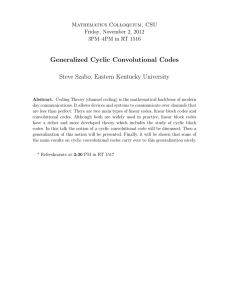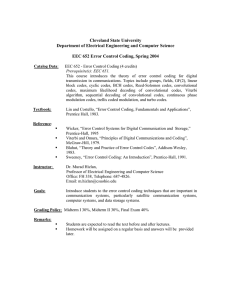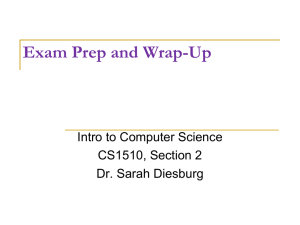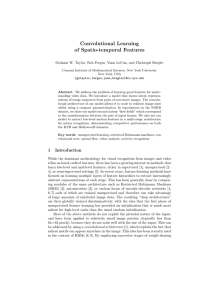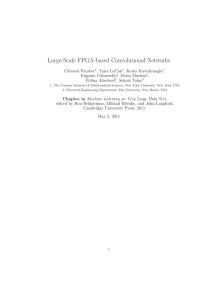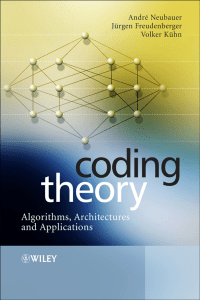KING FAHD UNIVERSITY OF PETROLEUM & MINERALS ELECTRICAL ENGINEERING DEPARTMENT Course Objectives:
advertisement
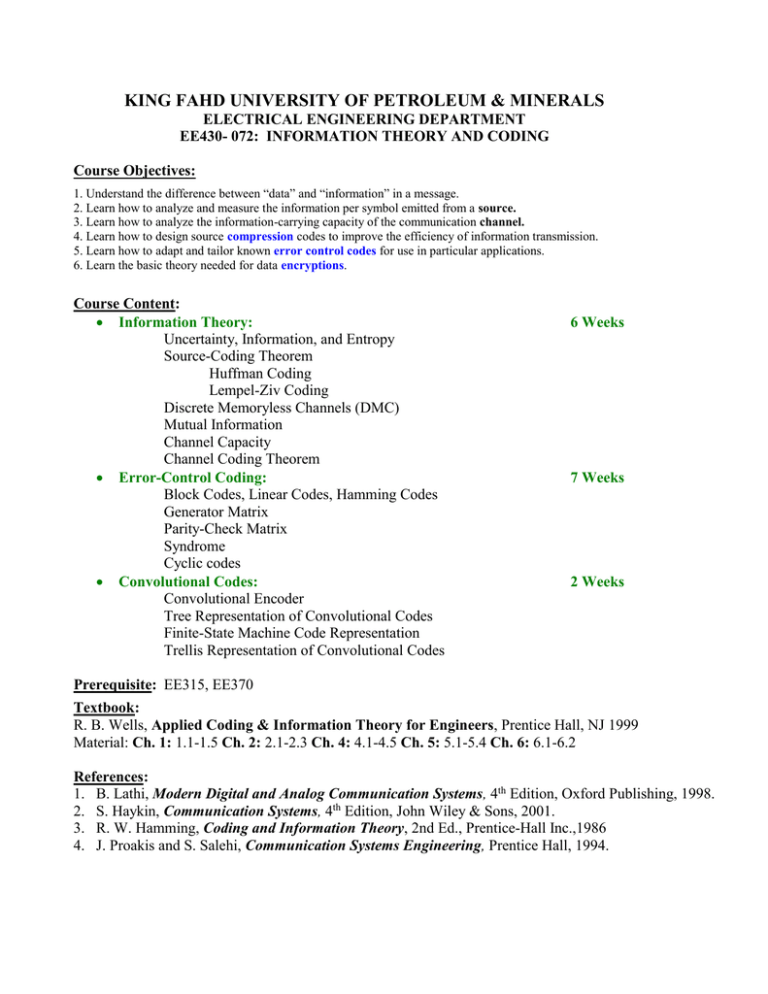
KING FAHD UNIVERSITY OF PETROLEUM & MINERALS ELECTRICAL ENGINEERING DEPARTMENT EE430- 072: INFORMATION THEORY AND CODING Course Objectives: 1. Understand the difference between “data” and “information” in a message. 2. Learn how to analyze and measure the information per symbol emitted from a source. 3. Learn how to analyze the information-carrying capacity of the communication channel. 4. Learn how to design source compression codes to improve the efficiency of information transmission. 5. Learn how to adapt and tailor known error control codes for use in particular applications. 6. Learn the basic theory needed for data encryptions. Course Content: Information Theory: Uncertainty, Information, and Entropy Source-Coding Theorem Huffman Coding Lempel-Ziv Coding Discrete Memoryless Channels (DMC) Mutual Information Channel Capacity Channel Coding Theorem Error-Control Coding: Block Codes, Linear Codes, Hamming Codes Generator Matrix Parity-Check Matrix Syndrome Cyclic codes Convolutional Codes: Convolutional Encoder Tree Representation of Convolutional Codes Finite-State Machine Code Representation Trellis Representation of Convolutional Codes 6 Weeks 7 Weeks 2 Weeks Prerequisite: EE315, EE370 Textbook: R. B. Wells, Applied Coding & Information Theory for Engineers, Prentice Hall, NJ 1999 Material: Ch. 1: 1.1-1.5 Ch. 2: 2.1-2.3 Ch. 4: 4.1-4.5 Ch. 5: 5.1-5.4 Ch. 6: 6.1-6.2 References: 1. B. Lathi, Modern Digital and Analog Communication Systems, 4th Edition, Oxford Publishing, 1998. 2. S. Haykin, Communication Systems, 4th Edition, John Wiley & Sons, 2001. 3. R. W. Hamming, Coding and Information Theory, 2nd Ed., Prentice-Hall Inc.,1986 4. J. Proakis and S. Salehi, Communication Systems Engineering, Prentice Hall, 1994. GRADING Grade Distribution Attendance Quizzes Computer Assignments & Presentation Major Exam I (Tue. March 25, in class 9:55-11:25am) Major Exam II (Tue. May. 6, in class 9:55-11:25am) Final Exam (Comprehensive) 3% 10 % 17 % 20 % 20 % 30 % Absence: Every unexcused absence results in -0.5 , 6 absences results in 0 out of 3 in the attendance and class performance, Two late arrival= One absence. Official Excuses: Official excuses have to be verified from the Students’ Affairs Dept. INSTRUCTOR: Dr. Ali Hussein Muqaibel Office 59-1088 Tel: 1595 Email: muqaibel@kfupm.edu.sa Web Site: http://faculty.kfupm.edu.sa/ee/muqaibel or WebCT O.H.’s: Check Website for updated information Tentative O.H.'s: Sun, Tue: 11:15 –Prayer Time, Mon: 10:15 - 11:30 AM or by appointment via e-mail. An office meeting in Monday 4:00-5:00PM may be possible with email pre-arrangement Desired Course Outcomes: 1. Students will demonstrate ability to evaluate the information rate of various information sources. 2. Students will demonstrate ability to design lossless data compression codes for discrete memoryless sources. 3. Students will demonstrate ability to evaluate the information capacity of discrete memoryless channels and determine possible code rates to achievable on such channels. 4. Students will demonstrate an ability to compensate for channel memory through the design of appropriate data translation codes. 5. Students will demonstrate an understanding of the mathematical theory of linear channel codes for error detection and correction. 6. Students will demonstrate the ability to select and design simple linear block error correcting codes. 7. Students will demonstrate an ability to implement cyclic block codes using feedback shift register logic circuits. 8. Students will demonstrate ability to select and design simple convolutional codes.
